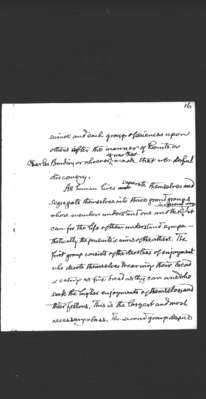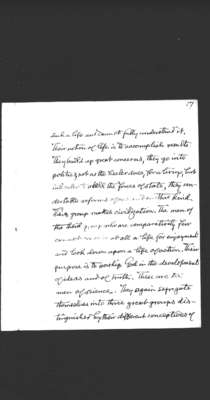Pages
16
16
science and each group of sciences upon others after the manner of Comte or Charles Burdin, or whoever it was that made that wonderful discovery.
All human lives separate themselves and segregate themselves into three grand groups whose members understand one another in a general way but can for the life of them understand sympathetically the pursuits & aims of the others. The first group consists of the devotees of enjoyment who devote themselves to earning their bread & eating as fine bread as they can and who seek the higher enjoyments of themselves and their fellows. This is the largest and most necessary class. The second group despise
17
17
such a life and cannot fully understand it. Their notion of life is to accomplish results. They build up great concerns, they go into politics, not as the heeler does, for a living, but into order to wield the forces of state, they undertake reforms of one and another kind. This group makes civilization. The men of the third group who are comparatively few cannot conceive at all a life for enjoyment and look down upon a life of action. Their purpose is to worship God in the development of ideas and of truth. These are the men of science. They again segregate themselves into three great groups distinguished by their different conceptions of
18
18
of the purpose of science. There are those who look upon themselves as the tutors and superiors of the doers. Science to their minds tells how the world's work is to be done; and the science they cultivate are the Practical Sciences. But in order to develope any practical science, a man must have the equivalent of a digest of science. A systematized account of all human knowledge. Therefore there must be a second class of men whose purpose it whose purpose it is to produce such digests, one working upon one part of it and another upon another. For these men, science is what Coleridge defined it as being, organized knowledge. This very business I am engaged in, of classifying
19
19
the sciences belongs to this group is a necessary part of the this work of systematizing and digesting human knowledge. I have called such sciences the Sciences of Review, and also Tactics, or Taxomathy Taxospoude Taxospude, the endeavor to arrange science. The third great division of science I call heuretics or heurospude, the endeavor to discover. It is true that all scientific men are engaged upon nothing else than the endeavor to discover. This is true of the taxospudists and the prattospudists as much as of the heurospudists. But the difference is that the prattospudists endeavor to discover for the ultimate purpose
20
20
of doing, and the taxospudists endeavor to discover for the purpose of applying knowledge in any way, be it in action or more especially in cognition. But the heurospudists look upon discovery as making acquaintance with God and as the very purpose for which the human race was created. Indeed as the very purpose of God in creating the world at all. They think it a matter of no consequence whether the human race subsists and enjoys or whether it be exterminated, as in time it very happily will be, as long soon as it has subserved its purpose of developing a new type of mind that can love and worship God better.




